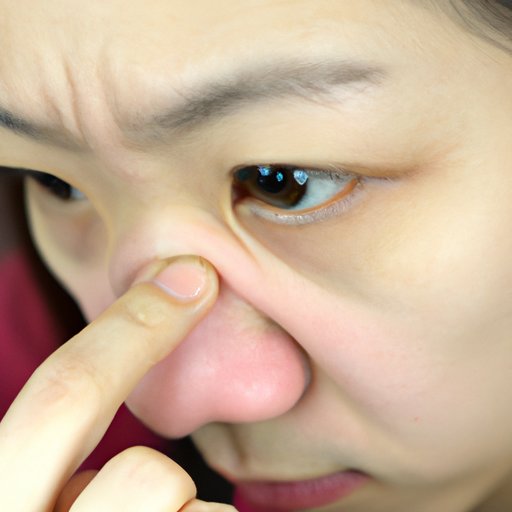
I. Introduction
Sinus disease, also known as sinusitis, is a common condition that affects millions of people worldwide. Sinus disease is a swelling of the tissue lining the sinuses that can cause discomfort, headaches, and other symptoms. Understanding the causes, symptoms, and treatments of sinus disease is essential for its management and prevention. This article aims to provide you with a comprehensive guide to sinus disease.
II. A Comprehensive Guide to Understanding Sinus Disease
The sinuses are air-filled cavities located in the skull. When the lining of the sinuses swells, it can cause blockage, leading to sinus disease. Sinus disease can be classified into four types: acute sinusitis, chronic sinusitis, subacute sinusitis, and recurrent sinusitis. The most common causes of sinusitis are allergies, bacterial or viral infections, nasal polyps, and deviated septum.
Common symptoms of sinus disease include facial pain, headache, nasal congestion, postnasal drip, and fatigue. If you are experiencing these symptoms, it is crucial to seek professional diagnosis and treatment. Diagnosis of sinus disease is usually based on physical exams, medical history, and imaging tests to confirm the disease’s severity level.
The treatment of sinus disease depends on the severity, type, and cause of the condition. Treatment options include over-the-counter medicine to alleviate symptoms, nasal sprays, antibiotics, antihistamines, decongestants and in severe cases, surgery could be necessary to remove blockages and alleviate pressure.
III. Sinus Disease: How to Spot, Prevent and Manage It Effectively
Sinus disease can be prevented by practicing good hygiene habits like washing hands regularly, avoiding irritants, and taking vaccines for flu and infections that can cause the disease. Effective management of sinus disease involves reducing exposure to allergens, such as dust mites or pollen. You can also treat sinus disease by using humidifiers to keep nasal passages moist, irrigating the nasal passages with saline water and avoiding exposure to smoke.
IV. Sinus Headaches and Congestion: Is it Sinus Disease? Everything You Need to Know
Sinus headaches and migraines share some symptoms, so it’s essential to distinguish between the two. Unlike migraines, sinus headaches typically begin in the morning and are characterized by facial pressure or pain, congested or runny nose, or cough. Treatment options for sinus headaches and congestion include over-the-counter medication and nasal sprays that help to relieve the symptoms. If the symptoms persist for more than ten days or are unbearable, it’s crucial to seek medical attention.
V. Suffering from Sinus Disease? Here’s How to Identify and Treat It Quickly
Early identification of sinus disease is crucial for effective treatment. You can identify acute sinusitis by its symptoms such as a runny nose, fever, fatigue, nasal congestion, and facial pain. Chronic sinusitis symptoms include nasal polyps, postnasal drip, and headache. Treatment options for the disease include over-the-counter medication, prescribed antimicrobial treatment, sinus irrigation, and a saline spray drop.
VI. Sinus Disease in Children: How to Recognize It and Help Them Recover
Sinus disease is also common in children, and early treatment is crucial to speed recovery and prevent complications. Sinus disease in children is commonly caused by allergies and viral infections. Symptoms include nasal discharge, cough, facial pain, headaches, and sometimes fever. Treatment options for younger patients may involve antibiotics, antihistamines, and saline drops. Prevention is often the best management method, and parents are advised to pay attention to good hygiene and encourage their child’s healthy habits.
VII. Conclusion
Sinus disease is a common condition that should not be ignored. If you experience the symptoms of the disease, it is essential to seek medical attention immediately. Prevention is often the best management method, and practicing good hygiene habits can go a long way. By understanding the causes, symptoms, and treatments of sinus disease, you can take proactive steps to manage and prevent the disease effectively. Share this comprehensive guide with family and friends to raise awareness about the condition and encourage others to seek help.





